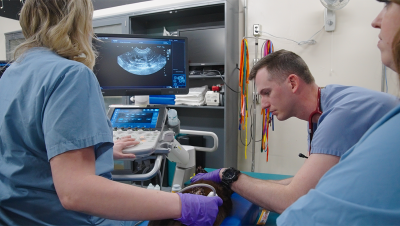
Most advances in medicine begin with laboratory experiments. However, lab animals live in controlled environments and represent limited genetic diversity, which is opposite the ever-changing world that the rest of us—animals, humans, and plants—share. Client-owned animals offer scientists and clinicians a stronger understanding of diagnostic and therapeutic outcomes in clinical trials.
Animal studies with clear parallels in disease pathogenesis, progression, and symptoms can be an effective intermediate step before human clinical trials are implemented. Clinical trials programs at MSU develop and facilitate translational research studies that may lead to new drugs, devices, procedures, and treatments that benefit humans and animals.
